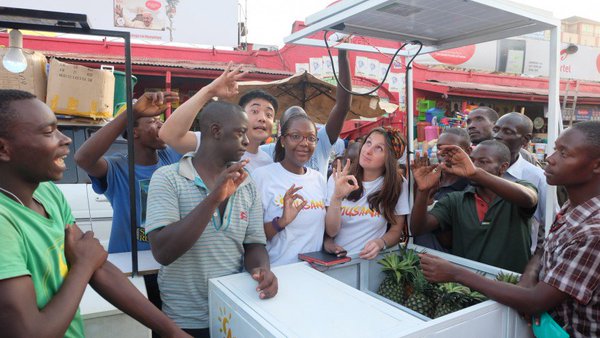
Natalie Bitature, the proprietor of Musana Carts, the solar street-vending revolution, spoke to Nicole Numubiru about her award-winning Musana Cart, which provides urban street vendors with a cleaner, safer, more efficient solution to their cooking, storage and financing needs. The Musana Cart is an environmentally-friendly, solar-powered vending cart that is customizable to the unique needs of each street vendor. The Musana Cart innovators are working in partnership with KCCA to spearhead the innovation in Kampala before rolling it out to other towns and countries.
What are the key elements in your management style?
I put people at the center, considering that the best work is done when people are committed to a cause and work in a respectful and fulfilling environment. I am promoting trust and persistence among our employees. At the same time, I fundamentally involve the community we serve in our management decisions. I promote interdependence in our relationships, looking for collaboration and exchange of ideas in our relations with our customers.
Can you briefly describe what Musana Carts is all about?
Musana Carts is about giving an opportunity to entrepreneurs who live in the shadow economy. We have developed a solar street-vending cart to leverage the business efficiency of these informal workers. But more than a simple product, Musana Carts allows each and every inspired entrepreneur in Uganda to start a legal business in the blink of an eye. We provide them with access to finance, financial literacy training and business license.
What is the motivation behind this innovation?
To create an opportunity for people who have been stuck in a vicious circle of poverty for too long. We want to raise the income of the urban poor, and drive them to create a business solution that is a change-making tool. We also want to work for a cleaner, brighter and more innovative Kampala. The current model of food vending is unsafe, environmentally hazardous and unsustainable to both the vendors themselves and the immediate public/environment for whom they prepare the food stuffs. So, we want to reduce the negative environmental and health impact of the street-vending activities.

Recently, your Musana Carts team was named as one of Africa’s top women’s innovators. What does this mean for you and the company?
It means the world is changing in the direction we work for. It also means our Industry is growing and gaining more and more attention. We have been honored to receive such an award as it validates our work. We will work harder to make African women innovators proud.
What is your assessment of small-scale business environment in Uganda?
These entrepreneurs are knowledgeable and hard-working business owners. We learn so much and are inspired by them every day; their persistence, resilience and the joy they find in their work. We aim to further empower these entrepreneurs by bringing legality and more skills to their work.
How about the market regulation in Kampala whereby KCCA does not allow street vendors?
The regulation of street vendors is the main challenge for KCCA and the vendors themselves. The vendors are often evicted from the markets or have their goods seized by the Authority. This sensitive situation deprives the vendors of an opportunity to make an honest living and income for themselves and their families. On the other side of things, KCCA is trying to make a cleaner and safer Kampala for the citizens, and that means to evict all street food activity, which pollutes the environment. Musana Carts offers a win-win solution for both parties by allowing the vendors to operate in a safer and regulated manner. We have partnered with the KCCA and we are aligned on our vision of a safer, cleaner and wealthier Kampala.
What are the future plans for Musana Carts in the next five years?
We plan on selling 1,000 carts in Kampala in year one and then to scale up to the other towns in Uganda. Once we have a strong brand and many satisfied customers in Uganda, we will be ready to expand to Tanzania, Kenya, Rwanda and West Africa with our franchise model, to ensure that our solution is made by the African community for the African community.
 The Independent Uganda: You get the Truth we Pay the Price
The Independent Uganda: You get the Truth we Pay the Price


